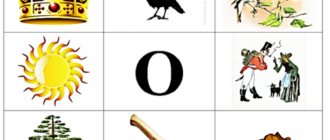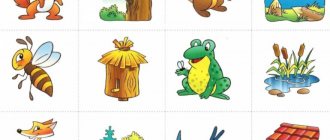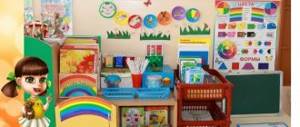Concept of logical thinking
Logical thinking is a physiological process as a result of which a person comes to conclusions based on evidence and prudence.
There are three types of logical judgments.
- Abstract judgment. A person builds conjectures on concepts and properties that cannot be felt. They are not valid, they are in the abstraction.
- Figurative judgment. A person uses his imagination and imagines specific images that occur in life.
- Verbal judgment. People often share their opinions with others. During the conversation, mental analysis occurs, leading to specific conclusions.
Logical thinking begins to develop at an early age. The stages of formation of thinking in the process of child growth will be discussed further.
How to develop logic in older preschool children
Psychologists, when asked how to develop the logic of a child of middle and senior preschool age, emphasize the intensity and activity of such work. By the beginning of school, children must master all logical operations: operate with a variety of concepts, reason independently and make inferences. Training should become permanent, so it is advisable to include games and exercises not only in special activities, but also in everyday life.
Important: in order to achieve a high level of development of children's logic, parents must make intellectual communication with their child a way of life.
This can be facilitated by both special tasks and games organized in family communication. The most popular of them are designed for solving logical problems: “Make a figure from matches”, “Sea battle”, “Tic-tac-toe”, puzzles, chess, puzzles. While walking in the forest, parents must draw their children’s attention to the diversity of the surrounding nature and teach them to see the general and the particular in the objects they observe. Nature provides great opportunities for a child to develop the ability to find and analyze cause-and-effect relationships: “If the clouds have thickened and darkened in the sky, it means ... (it will rain)”; “From the acorns lying under the oak tree... (young oak trees) will grow”; “Make a biological chain (flower-dragonfly-bird).”
"Let's play association"
Classic logical tasks for finding associations are intended mainly for older preschoolers. If work on child development is carried out over a long period of time, associations will be available to children of middle preschool age. The tasks broaden one's horizons, develop the ability to generalize, compare, analyze, and classify.
Tasks for middle preschoolers
An adult offers children pictures depicting objects of different groups: shoes, clothes, furniture, household appliances. The child must combine all the cards into different groups, based on common features. You can invite children to play with a ball, offering various interesting tasks:
- “say the opposite (soft-hard, big-small, laugh-cry, winter-summer)”;
- “name a similar object (ball-watermelon, sun-bun, snow-fluff, hedgehog-thorn)”;
- “Name in one word (apple, pear, plum – fruits, tomato, cucumber, pepper – vegetables, armchair, sofa, wardrobe – furniture).”
The classic ball game “I know three vegetables, fruits...” helps develop logic, the ability to think quickly, and enriches vocabulary.
Tasks for older preschoolers
To develop a child’s knowledge about associative connections, tasks for constructing logical chains are well suited:
- “complete the rows” - the child is offered a card with rows of similar objects, for example, toys: spinning top, cube, doll, bear; vegetables: tomato, cabbage, cucumber; clothes: jacket, sweater, trousers. The kid must select the appropriate cards, completing the row, and ask the older children to draw on the objects of the same group.
- “make a row” - the child is offered a card with drawn objects that are arranged accordingly, for example,
1st row – two dolls, two bears, two balls, 2nd row – doll, bear, ball, etc., 3rd row – two dolls, a ball, two bears, a ball. The preschooler must independently create similar rows using prepared cards or by drawing them. The task helps well in developing the child’s operations of generalization, analysis, and comparison. In the future, when preschool children master associative series, you can offer complex tasks:
- guess the row itself,
- guess the missing items,
- what is wrong in the series.
Logic toys for family leisure
Educational toys that are fun for the whole family to play with will greatly help in the development of logical thinking in preschoolers. The child’s development will take place in an immediate environment, which will help parents both play and teach their child with passion. Now you can find many logic games and educational toys on children's portals and specialized stores. Kids can be interested in logical inserts that will tell them about geometric shapes and teach them how to manipulate them; magic bags - will help to form concepts; mosaics - will develop logical imagination. Older children play with labyrinth toys, logical traps that teach them to look for non-standard solutions, and various games with rules that expand their intellectual capabilities.
Development of logical thinking in preschoolers
Bibliographic description:
Novak, O. V. Development of logical thinking in preschoolers / O. V. Novak. — Text: direct // Education and upbringing. - 2019. - No. 5 (25). — P. 15-18. — URL: https://moluch.ru/th/4/archive/139/4392/ (date of access: 10.10.2020).
Logic is a necessary tool that frees you from unnecessary, unnecessary memorization, helping you find in the mass of information what is valuable that a person needs.
N. K. Anokhin
The development of logical thinking is a very important and necessary process for everyone!
But we will say, why does a child, a preschooler, need logic? Yes, the fact of the matter is that the acquired skills and abilities in preschool age will be the beginning for the development and acquisition of knowledge at school. The ability to “act in the mind,” that is, in other words, the skill of logical thinking, is one of the most important skills. If a child does not have developed logical thinking techniques, it will be more difficult for him to study, and as a result the child’s health may suffer. And how often do we, educators, hear that a child’s logic is not developed. The desire to teach children to think clearly and clearly leads to the need to take logic games as a basis. Knowledge of logic contributes to the cultural and intellectual development of the individual. In this regard, the goal was set: to theoretically substantiate and experimentally test the system of work on the development of logical thinking in preschool children through game situations, namely through didactic games and exercises that V.V. Voskobovich offers.
To do this, it is necessary, firstly, to create pedagogical conditions, taking into account individual age characteristics, to stimulate each child when organizing play activities using searching, entertaining questions. Secondly, set goals for yourself by analyzing the level of development of logical thinking in children through the use of game situations; think over and create a subject-development environment and develop a system for performing actions on this problem.
In order to better approach the solution to this problem, the works of V.V. Voskobovich were studied and seminars were repeatedly attended on the topic “Game technology for the intellectual and creative development of children “Fairy tale labyrinths of games” by V.V. Voskobovich in the context of the implementation of the Federal State Educational Standard”
Voskobovich’s educational games are based on two learning principles: “from simple to complex” and “independently according to ability.” This allows you to solve several problems in the game related to the development of abilities:
Firstly, educational games can provide food for the mind from a very early age.
Secondly, their tasks—steps—always create conditions for advancing the development of abilities.
Thirdly, by rising, each time on his own, to his ceiling, the child develops most successfully.
Fourthly, educational games can be very diverse in their content, and besides, like any games, they do not tolerate coercion and create an atmosphere of free and joyful creativity.
Fifthly, by playing these games with children, adults, unnoticed by themselves, acquire the very important ability to restrain themselves, not to disturb the child, to think and make decisions for themselves, and not to do for him what he can and should do himself.
This path most contributes to the development of independent thinking, self-control and logical intuition.
Teaching mathematics to preschool children is unthinkable without the use of entertaining games, tasks, and entertainment.
The most important condition is the use of a system of games and exercises. The child performs mental actions - comparison, analysis, synthesis, classification, generalization.
By analyzing small mathematical problems, the child learns to navigate the world around him, take initiative, express his own position and accept someone else’s.
In my work I use games to develop logical thinking.
As part of the direction of work on the development of logical thinking through games, V.V. Voskobovich conducts individual and group classes taking into account the assigned tasks.
The working methods are very easy to implement into the usual educational and gaming process; this is the main feature of V.V. Voskobovich’s technology.
Children who studied according to Voskobovich's method learn the names of colors early, learn to count early, know geometric shapes, and orient themselves on planes.
What you should pay attention to when working with your child on Voskobovich’s games:
− Preparation. Before offering the game to your child, read the guidelines and the game itself.
− Speech. Mostly children work with their hands and speak little. During classes, ask your child what he is doing, why he chose this particular figure and not another, ask him to retell the fairy tale task or come up with his own plot.
− Static. When engaging with play materials, the child is most often in the same sitting position. It is necessary to take into account the age characteristics of children and promptly distract those who are playing too much from the game.
− Perseverance. Playing with Voskobovich's manuals requires perseverance, and not every child likes or is able to do this.
From my work experience, I can say with confidence that the use of games using the technology of V.V. Voskobovich gives an effective result in the development of logical thinking in preschoolers. Therefore, I recommend that teachers of preschool children use Voskobovich’s educational games in their practice of teaching children mathematics.
In conclusion, it is important to note that the possibility of successful development of a child’s mathematical abilities is determined by the level of professional competence of teachers.
Literature:
- Voskobovich V.V., Vakulenko L.S. Educational games of Voskobovich. "TC Sfera" 2020
- Voskobovich, V.V., Kharko, T.G. Game technology for the intellectual and creative development of preschool children 3–7 years old “Fairytale labyrinths of games” / V.V., Voskobovich, T.G. Kharko. - M., 2007
- Nikitins B.P. and L.A. We and our children - M.: Young Guard 1990
Key terms
(automatically generated)
: logical thinking, game, child, preschool age, class time, development.





